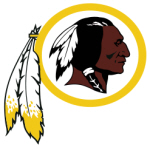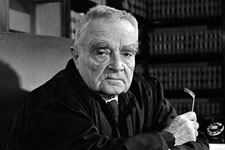 Earlier today (Nov. 16) the United States Supreme Court denied cert. in the case of Harjo v. Pro-Football, Inc., bringing to a close, at least for the moment, litigation concerning the legality of the Washington NFL team’s registration of its “Redskins” trademark. The decision not to hear the case was announced without comment.
Earlier today (Nov. 16) the United States Supreme Court denied cert. in the case of Harjo v. Pro-Football, Inc., bringing to a close, at least for the moment, litigation concerning the legality of the Washington NFL team’s registration of its “Redskins” trademark. The decision not to hear the case was announced without comment.
In 1992, Native-American activist Suzan Harjo, on behalf of herself and six others, petitioned the Trademark Trial and Appeal Board (TTAB) to cancel six trademark registrations granted to the Redskins beginning in 1967. (Although team had used the name “Redskins” since 1933, it did not attempt to register the trademark until 1967.)
The gist of Harjo’s argument was that the TTAB had erred in registering the trademark because it violated section 2(b) of the federal Lanham Trademark Act, which prohibits the registration of a mark that “consists of or comprises immoral, deceptive, or scandalous matter; or matter which may disparage or falsely suggest a connection with persons, living or dead, institutions, beliefs, or national symbols, or bring them into contempt, or disrepute.”
The Redskins (who do business as Pro-Football, Inc.) defended on grounds that the trademark was not offensive and that such an interpretation of the Lanham Act unconstitutionally violated the team’s rights under the First and Fifth Amendments to the United States Constitution.
In 1999, seven years after the initial claim, the TTAB ruled in favor of Harjo, finding that the trademarks “may be disparaging of Native Americans to a substantial composite of this group of people,” and “may bring Native Americans into contempt or disrepute.” Consequently, it scheduled the cancellation of the offending marks. The ruling was appealed to the United States District Court for the District of Columbia, which in 2003 ruled that the complainants had failed to establish that the marks were in fact disparaging and that in any event their failure to bring the claim in a timely fashion—25 years passed between the first registration and the initial complaint—resulted in it being barred by the equitable doctrine of laches.
On the appeal of that decision, the Court of Appeals for the District of Columbia ruled in 2005 that the laches defense was valid for six of the seven petitioners, but remanded the action to the District Court for a determination whether or not the defense was valid as applied to petitioner Mateo Romero who was only one year old when the mark was first registered in 1967. It retained jurisdiction over the “disparagement” claim without ruling whether the TTAB or the District Court were correct.
Upon reconsideration the District Court concluded that the laches defense applied to Romero as well, given his understanding of the issues involved prior to reaching the age of majority and his failure to object to the registration until almost eight years after reaching the age of majority. This conclusion was upheld by the Court of Appeals in May of 2009, and it was this decision that the Supreme Court decided today not to review.
There are apparently plans, however, to re-file the challenge to the registration but this time using Native American challengers who have just reached the age of majority. The earlier Circuit Court of Appeals decision suggested that such plaintiffs would not be barred by the laches defense. Such a case will presumably reopen the question of the propriety of the Redskins trademark.
Of course a reprisal of the original TTAB ruling would not prevent the Washington team from continuing to use the name “Redskins.” It would, however, prevent the team (and the NFL) from excluding others from making use of the name.
A subsequent post will examine the historical background of the team name, Washington Redskins.

